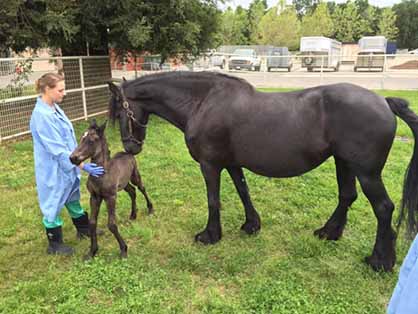Behind the Scenes in the Neonatal Care Unit For Critical Foals
 UC Davis School of Veterinary Medicine
UC Davis School of Veterinary Medicine
One of the most thrilling and heartwarming experiences in the equine world is seeing a healthy foal stand within minutes of birth. However, sick foals can have some of the highest mortality rates in veterinary medicine. Therefore, the effort to save them takes a talented and dedicated team of professionals in the Equine Medical Emergency, Critical Care and Neonatology Service who work around the clock in order to beat the odds.
Sick foals brought to UC Davis are seen in the Lucy G. Whittier Neonatal Intensive Care Unit (NICU) at the veterinary hospital. The highly-trained team, led by Dr. Gary Magdesian, chief of service and the holder of the Roberta A. and Carla Henry Endowed Chair in emergency medicine and critical care, can handle the most complicated cases, providing 24/7 coverage. Resident veterinarians, technicians, veterinary students, and undergraduate members of the UC Davis Foal Team are also part of the cooperative effort involved in managing these patients.
The NICU is equipped with customized stalls to support sick foals, allowing intensive management under the watchful eye of the mare in an adjoining stall.
Critical conditions the NICU treats include maladjusted foal syndrome, failure of passive transfer, neonatal iserythrolysis, orthopedic problems (i.e. contracted legs, crooked legs), prematurity, sepsis and much more. Additionally, other post-foaling procedures performed by the NICU include: providing physical therapy for foals with leg deformities; evaluating the mare’s reproductive tract with the hospital’s Equine Reproduction Service; retaining placentas in the mare; and milking mares to feed foals if necessary.
Care of premature foals can be especially laborious. In addition to the many potential health problems, premature foals’ bones are not fully ossified, causing them to stay off their feet for potentially weeks. To accomplish this, the NICU enlists the help of the Foal Team. Often, their sole job is to sit with foals in their stalls and prevent them from standing up.
One dedicated team member recently tweeted, “Spent from 2:30 a.m. – 8 a.m. taking care of a foal in the neonatal ICU and somehow I’m not even tired.”
It is that type of dedication that is needed to see these mares and foals through a lengthy stay in the NICU. A foal named Brave recently spent 43 days in the NICU after he was born five weeks premature. Very few equine hospitals have the capability to care for a critically sick foal 24/7 for more than a month straight – one of the many advantages of utilizing UC Davis for your veterinary needs.
This expert care of foals can be seen in action in the YouTube video “Foal Care at UC Davis.”










